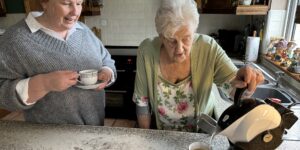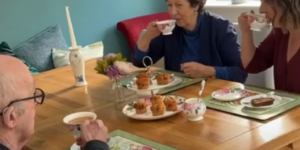Independence in activities of daily living (ADLs) is something most of us take for granted until it becomes a challenge For individuals facing difficulties in performing basic tasks due to physical, cognitive, or emotional limitations, occupational therapy (OT) can be a life-changing resource. Today, we will explore the role of occupational therapy in promoting independence in ADLs and how it can positively impact the lives of those who need it.
Understanding Activities of Daily Living (ADLs)
ADLs are the routine activities that we all perform to take care of ourselves and maintain our well-being. These activities can be categorized into 2 main groups:
- Basic ADLs: These include fundamental self-care tasks such as bathing, dressing, grooming, toileting, and drinking/eating.
- Instrumental ADLs (IADLs): These are more complex activities necessary for independent living, like cooking, shopping, managing finances, shopping, and using transportation.
Maintaining independence in ADLs is crucial for a person’s self-esteem, dignity, and overall quality of life. This is where occupational therapy comes into play.
The Role of Occupational Therapy
Occupational therapists are trained professionals who specialise in helping individuals regain or develop the skills needed to perform ADLs independently. Here’s how they do it:
- Assessment: The first step in OT is a thorough assessment of the individual’s physicals, cognitive, and emotional abilities and limitations. This helps identify specific challenges in performing ADLs.
- Goal Setting: Occupational therapists work closely with their clients to set personalised goals for improving ADL performance. These goals are tailored to the individuals needs and aspirations.
- Skill Development: OT sessions focus on developing or retraining the skills required for ADLs. This may involve exercises, adaptive techniques, or assistive devices to make tasks easier.
- Environmental Modifications: Occupational therapists often recommend changes to the home or work environment to enhance independence and safety. This can include installing grab bars, ramps, or adaptive kitchen tools like our Uccello Kettle.
- Psychological Support: OT also address the emotional aspect of ADLs. Coping with limitations can be challenging, and occupational therapists provide emotional support and coping strategies.
Success Stories
The impact of occupational therapy on individuals’ lives is profound. Here are a few success stories that illustrate its significance:
- Jack, a stroke survivor, regained his confidence and independence through OT, allowing him to dress, bathe, and even cook for himself again.
- Sarah, a young adult with cerebral palsy learned adaptive techniques to manage her finances and shop independently, improving her overall quality of life.
- Elderly Couple Mary and Nigel received OT services that made their home safer and more accessible allowing them to continue living independently as they aged.
Occupational therapy plays a pivotal role in promoting independence in ADLs, helping individuals regain their self-sufficiency and improve their quality of life. Whether it’s through skill development, assistive devices, or environmental modifications, OT professionals empower their clients to live life to the fullest.
If you or a loved one are facing challenges in performing daily tasks due to physicals, cognitive, or emotional limitations, consider exploring occupational therapy as a valuable resource to enhance independence and regain control over your life.
Remember, independence is not just a goal; it’s a path to a more fulfilling and empowered life.
This blog post explores the crucial role of occupational therapy in empowering individuals to maintain independence in their daily lives. If you have any questions ot would like more information on this topic, feel free to reach out.













Leave a Comment